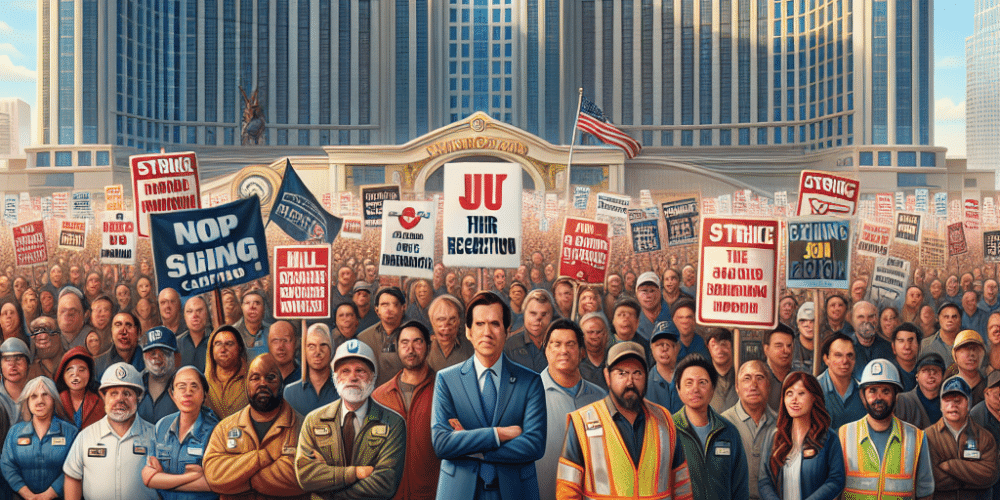Table-game dealers and pit bosses at Horseshoe Indianapolis Casino have been on strike for over a month, steadfastly demanding union recognition as they maintain a round-the-clock presence outside the Shelbyville casino. The strike began in mid-October, immediately following the suspension of a planned union vote due to a federal government shutdown, which left workers without the chance for official representation.
Approximately 200 workers, many with extensive experience in the casino industry, have joined the strike, which they view as a powerful expression of their frustration and solidarity. The strike isn’t solely about higher wages. Instead, the workers are demanding more comprehensive support and involvement in key workplace decisions. Tara Arnold, a veteran dealer, highlighted that despite her years on the job, her pay has not kept pace with the rising cost of living. She emphasized that the strike has fundamentally altered her daily routine, as she now dedicates countless hours to the picket line.
Caesars Entertainment, which operates the casino, maintains that operations have continued without disruption. However, striking workers challenge this narrative, arguing that the absence of seasoned staff has led to noticeable changes, such as increased minimum bets and the closure of some gaming tables. They argue that these adjustments reflect the impact of the ongoing strike and the difficulty the casino faces in maintaining its usual operations without its skilled workforce.
The strike has also fostered a sense of community and strengthened bonds among the workers. Dealer Dakota Massman shared that the picket line has become a source of morale-boosting camaraderie, with many viewing the strike as a unifying force. He noted that the shared experience has not only helped them endure long days and inclement weather but has also resulted in deeper friendships and a greater sense of control over their circumstances.
The labor dispute has further escalated with legal actions involving the city of Shelbyville. Teamsters Local 135 has filed a lawsuit against the city and its police chief, accusing them of unlawfully displacing strikers from public areas at the alleged behest of casino executives. This move, the union claims, infringes upon the workers’ right to protest, a claim that is currently under investigation by city officials. Meanwhile, Caesars Entertainment has reiterated its respect for workers’ rights to unionize and expressed a commitment to adhering to the National Labor Relations Board’s guidelines once the election process resumes.
As of now, no vote is scheduled, and negotiations remain stalled. Workers have expressed their determination to continue the strike for as long as necessary, hoping that either management will concede to their demands or that an alternative resolution will be proposed. They remain resolute in their fight for recognition and fair treatment.
While the workers’ resolve remains unshaken, some industry analysts suggest that prolonged strikes can have adverse effects on both the business and the workers. Casinos rely heavily on customer satisfaction and seamless operations, both of which can be jeopardized by ongoing labor disputes. The potential for financial losses looms large, not just for the business but also for the workers who are sacrificing wages in the hope of future gains.
From a broader perspective, the situation at Horseshoe Indianapolis reflects a growing trend of labor unrest in various sectors across the country. As workers increasingly seek better compensation and working conditions, businesses are confronted with the challenge of balancing operational needs with employee demands. This dynamic has sparked debates about the future of labor relations and the potential need for more robust frameworks to address such disputes effectively.
Despite these challenges, the workers at Horseshoe Indianapolis remain hopeful. They believe that their collective action will eventually lead to meaningful change and set a precedent for other workers in similar situations. As one striker expressed, the sense of empowerment and unity they have gained from standing together in pursuit of a common goal far outweighs the immediate hardships they face.
In conclusion, the strike at Horseshoe Indianapolis is more than a labor dispute; it is a testament to the power of collective action and the enduring quest for fairness and respect in the workplace. As the situation unfolds, all eyes are on how Caesars Entertainment and the city will respond, and whether the workers’ steadfast determination will ultimately yield the results they seek.

David Harrison stands tall in gambling journalism, marrying his firsthand casino experiences with a deep understanding of betting psychology. His articles transform complex gambling jargon into engaging tales of strategy and chance, making the world of betting accessible and enjoyable. David’s knack for narrative extends beyond print, making him a sought-after speaker on gambling trends and future bets. In the realm of gambling, David is both a scholar and a storyteller, captivating readers and listeners alike.
















